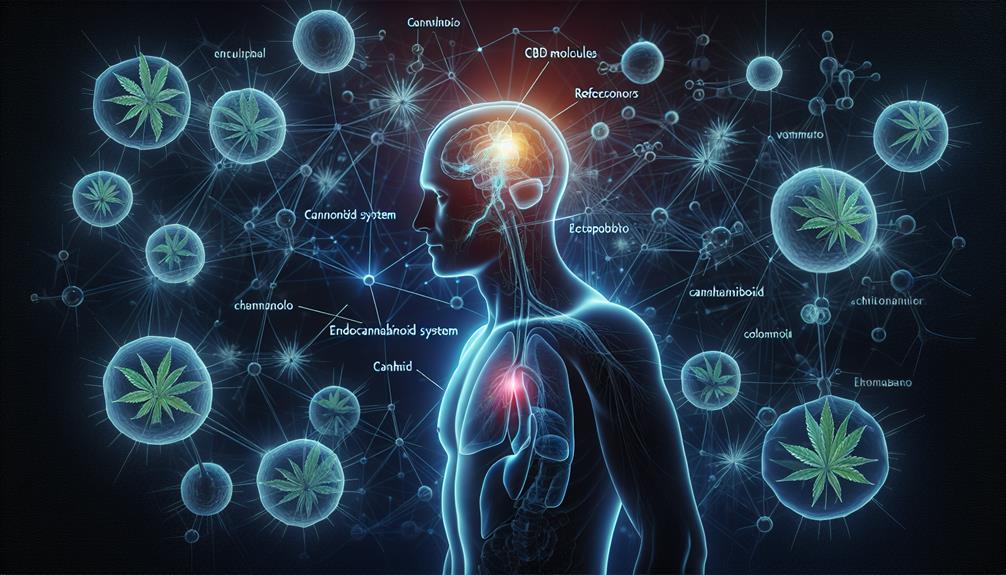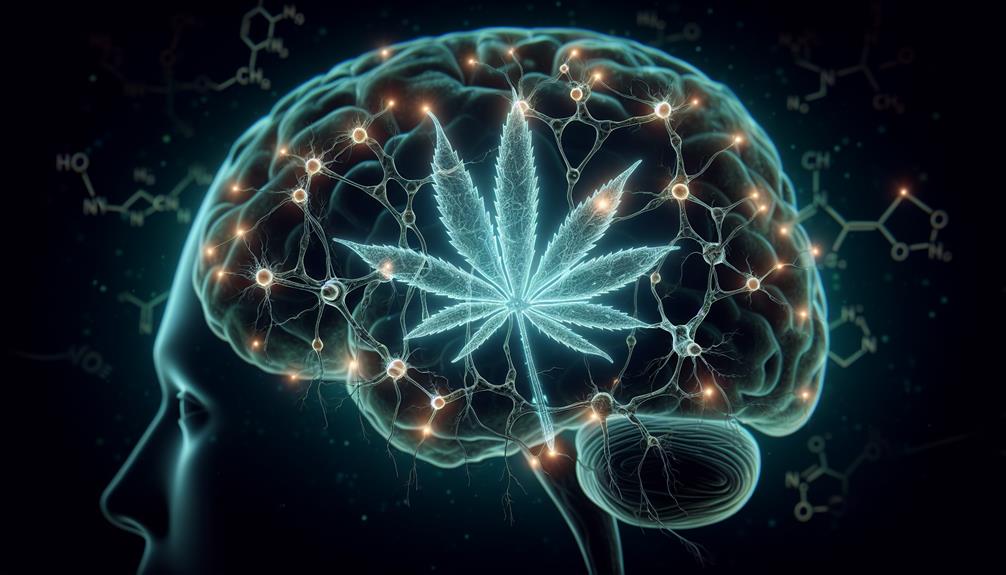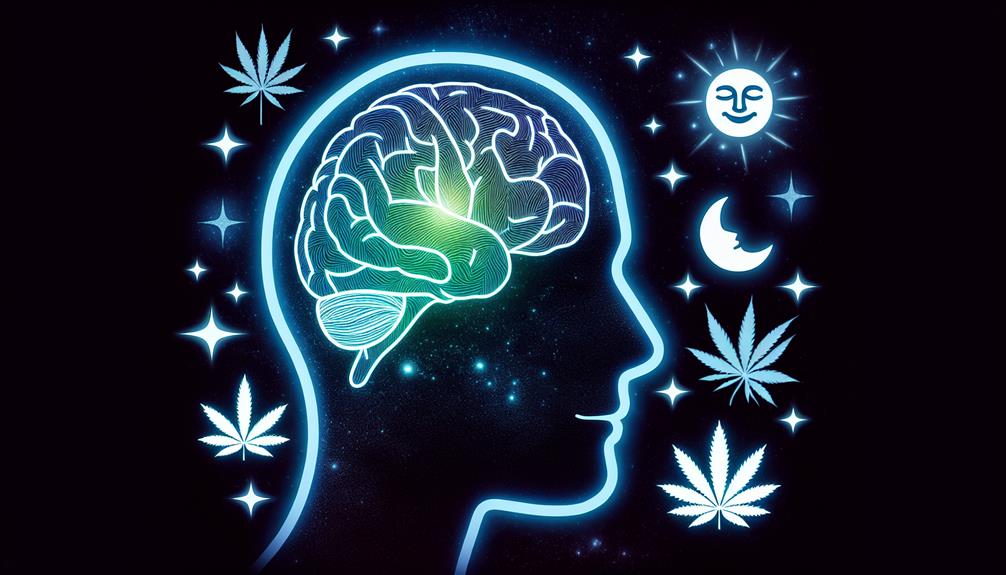While ancient traditions embraced the medicinal properties of cannabis with little understanding of its inner workings, you now stand at the forefront of a scientific revolution that demystifies cannabidiol (CBD), a non-intoxicating component poised to reshape contemporary wellness practices. As you navigate through the complexities of the human body, it's crucial to grasp how CBD orchestrates a delicate dance with the body's endocannabinoid system to maintain balance and promote health. You've likely heard claims of its therapeutic potential, ranging from pain relief to mood stabilization, but what you may not know is the intricate biological symphony that enables such effects. To truly appreciate the nuances of CBD's impact, let's explore the molecular interactions that drive its mechanism of action, and consider how this knowledge could revolutionize your understanding of natural health solutions. Will the science align with anecdotal testimonies, or will rigorous research reveal a different narrative? Stay tuned as we uncover the layers of complexity behind this enigmatic compound.
Understanding Cannabidiol (CBD)
Cannabidiol, commonly known as CBD, is a non-psychoactive compound found in the cannabis plant that interacts with the body's endocannabinoid system (ECS) to modulate functions such as pain, mood, and immunity. Extracted primarily from hemp plants, CBD's influence on the ECS offers a range of potential health benefits.
Your body's ECS plays a crucial role in maintaining homeostasis. It comprises endocannabinoids, enzymes, and receptors—specifically CB1 and CB2 receptors. CB1 receptors in the brain help to regulate neurotransmitter release, influencing mood and central nervous system functions, while CB2 receptors are more prevalent in the peripheral organs, especially cells associated with the immune system.
The effects of CBD stem from its interaction with these receptors, though it does not bind to them directly like THC. Instead, it modulates their activity, affecting endocannabinoids like anandamide and 2-AG. This can support the body's natural balance and functioning.
Available in various forms, CBD products have garnered attention for their potential in providing relief from chronic pain, aiding sleep, and reducing inflammation. As you delve deeper into the science of CBD, you'll discover a complex interplay between the compound and your endocannabinoid systems, illustrating how this plant-derived substance assists in promoting wellness.
The Endocannabinoid System Explained
Building on the understanding of CBD's role in modulating the endocannabinoid system, let's explore the intricacies of this complex biological system and its impact on your health. The human body's endocannabinoid system function is pivotal, as it helps regulate a plethora of physiological processes, including mood, sleep, appetite, immune response, and stress.
This system is composed of endocannabinoids, which are lipid-based neurotransmitters called endocannabinoids, that bind to specific receptors. These receptors are mostly found throughout the central nervous system (CB1) and the immune system (CB2). CBD affects the activity of these receptors indirectly, which may explain its potential therapeutic effects.
For instance, a deficiency in the endocannabinoid system might be linked to various health issues. CBD's interaction with the ECS, particularly its inhibition of endocannabinoid breakdown, supports the system's balance. Additionally, CBD influences non-cannabinoid receptors, like the TRPV1 receptor, which is involved in pain perception.
The interplay of cannabinoids and terpenes found in CBD products can further modulate the ECS to provide a range of benefits, potentially aiding in the relief of chronic pain, the improvement of sleep quality, and the reduction of inflammation. Understanding these mechanisms is crucial for comprehending how CBD contributes to health and wellness.
Cbd's Interaction With Receptors

Delving into the interaction of CBD with various receptors reveals its multifaceted role in modulating essential bodily functions. CBD, a non-intoxicating compound, engages with cannabinoid receptors CB1 and CB2 to influence mood, pain sensation, and the immune system. While CB1 receptors are predominantly situated in the brain and central nervous system, CB2 receptors are found mainly in the peripheral tissues, including those of the immune system, playing a key role in managing inflammation and chronic pain.
Moreover, CBD acts on the vanilloid receptor type 1 (TRPV1), known for mediating pain perception, temperature regulation, and inflammation. By targeting TRPV1, CBD may offer pain relief and help reduce inflammation, which is beneficial in treating various neurological conditions.
The interaction of CBD with these receptors also contributes to maintaining homeostasis, or balance, within the body. It modulates neurotransmitters and inflammatory markers, and it may inhibit the breakdown of endocannabinoids, thereby prolonging their positive health effects. This action helps to elevate the body's natural capacity to regulate pain, mood, and immune response, ensuring consistent functionality of the peripheral and central nervous systems.
Potential Anti-Inflammatory Effects
Expanding upon its interaction with receptors, CBD exhibits promising anti-inflammatory properties that may stem from its ability to modulate cytokine production within the immune system. Research suggests that CBD, a prominent compound found in cannabis products, has the potential to reduce pain by reducing inflammation. This is significant considering the vast array of health problems where pain and inflammation are central symptoms.
The anti-inflammatory effects of CBD may relate to its actions on the peripheral nervous system. Specifically, its influence on the vanilloid receptor type 1 (TRPV1), known for mediating pain perception, temperature regulation, and inflammation, underscores its potential use as an analgesic and anti-inflammatory agent.
Here's an analytical look at how CBD might impact inflammation:
| Receptor Interaction | Potential Impact on Inflammation |
|---|---|
| CB2 Receptor Activation | Suppression of cytokine production, reducing immune response inflammation |
| TRPV1 Modulation | Decreased pain and inflammation signaling |
| Cytokine Production Modulation | Potential reduction in excessive inflammatory responses |
As research progresses, the nuances of how CBD modulates these pathways continue to clarify, hinting at a future where CBD-based interventions might become a staple in managing inflammatory health issues.
CBD and Neuroprotection

As you explore CBD's role in neuroprotection, consider its potential to shield brain cells from damage. Investigate how CBD's modulation of the endocannabinoid system, specifically its influence on CB1 and CB2 receptors, may underpin its protective mechanisms. Analyze the evidence suggesting that by mitigating neuroinflammation, CBD could offer therapeutic benefits for debilitating conditions like Alzheimer's and Parkinson's disease.
CBD's Protective Mechanisms
CBD's neuroprotective properties arise from its complex interactions with the endocannabinoid system, potentially slowing the breakdown of endocannabinoids and facilitating brain health maintenance. Research delves into how CBD works, revealing protective mechanisms that could be effective for treating neurological disorders. Here's what you need to know:
- Interactions with Receptors: CBD modulates CB1 and CB2 receptors, impacting your immune response and brain function.
- TRPV1 Activation: CBD's effect on the vanilloid receptor aids in pain management and inflammation reduction.
- Endocannabinoid Preservation: CBD may inhibit the breakdown of these molecules, supporting neuroprotection.
- Diverse Delivery Methods: Edibles, smokables, and topicals each offer unique benefits due to varied absorption rates.
- Potential Health Benefits: Ongoing research suggests CBD could help relieve chronic pain and improve sleep, further contributing to its protective role.
Brain Health Benefits
Understanding the protective mechanisms of CBD lays the foundation for exploring its specific benefits for brain health, particularly its role in neuroprotection. CBD can help safeguard neurological function by modulating the endocannabinoid system, which is pivotal for maintaining mental health. It impedes the degradation of critical endocannabinoids like anandamide, enhancing their regulatory capacity on memory and emotional balance. Unlike THC, CBD lacks psychoactive effects, instead favoring a therapeutic profile that might alleviate symptoms of anxiety and depression. Binding to CB1 and CB2 receptors, CBD influences mood and immune responses, while interaction with TRPV1 receptors highlights its potential in managing neuroinflammation. Although promising for various neurological disorders, the effectiveness of CBD warrants further exploration, and more research is needed to substantiate its brain health benefits.
The Role of CBD in Pain Management
Exploring the role of CBD in pain management reveals how this compound potentially dulls discomfort by desensitizing the TRPV1 receptor, a critical player in modulating pain and temperature sensations. When you use CBD, it may help reduce symptoms associated with various health conditions, ranging from chronic pain to acute inflammation. Its potential for CBD in treating pain stems from a multifaceted interaction with the body's endocannabinoid system and other receptor pathways.
Here's a detailed look at how CBD might be beneficial in pain management:
- Desensitization of TRPV1 Receptors: CBD's ability to desensitize the TRPV1 receptor can disrupt pain signals and provide relief.
- Allosteric Modulation: CBD acts as an allosteric modulator of μ- and σ-opioid receptors, potentially altering the efficacy of endogenous opioids.
- Analgesic Properties: The interaction of CBD with pain receptors underscores its analgesic potential, helping to alleviate pain without the adverse effects commonly associated with THC.
- Anti-addictive Qualities: CBD's modulation of opioid receptors might also aid in treating opioid addiction, offering a non-intoxicating alternative to THC-based treatments.
- Comprehensive Interaction: CBD engages with various receptor systems, suggesting a broad therapeutic scope for managing pain across a spectrum of health conditions.
CBD's Impact on Sleep and Mood

Investigations into cannabidiol (CBD) reveal its potential as a therapeutic agent for enhancing sleep quality and stabilizing mood in individuals experiencing insomnia and anxiety-related disturbances. The technical analysis of CBD's interaction with the body's endocannabinoid system suggests that its administration could lead to improved sleep patterns by modulating the sleep-wake cycle. CBD products, comprising varying mg of CBD per serving, have shown promise in potentially providing relief for a range of health issues, particularly those affecting sleep and mood.
The sedative effects of CBD may help in treating a number of sleep-related disorders. By promoting a sense of relaxation, CBD can potentially reduce excessive daytime sleepiness and extend the duration of deep sleep. In addition, its anxiolytic properties can improve the quality of life for those with anxiety, a common contributor to sleep disruption.
Here's a breakdown of CBD's impact on sleep and mood:
| Potential Benefits | Related Effects on Sleep and Mood |
|---|---|
| Enhances Sleep Quality | Reduces Insomnia Symptoms |
| Stabilizes Mood | Alleviates Anxiety-Related Sleep Disturbances |
| Sedative Properties | Induces Sense of Relaxation Leading to Improved Sleep |
This analytical overview underscores how CBD might assist in addressing some sleep and mood disorders, though more detailed clinical research is needed to fully understand and optimize its therapeutic potential.
Exploring the Entourage Effect
When considering the multiplicative benefits of cannabis-based therapies, it's essential to delve into the entourage effect, a phenomenon where the combined presence of CBD, other cannabinoids, and terpenes in full spectrum products potentially amplifies their collective therapeutic impact. This concept is central to understanding the nuanced interplay between the various compounds found in the cannabis plant.
- Synergistic Interaction: The entourage effect posits that the therapeutic efficacy of CBD is enhanced when combined with other plant compounds.
- Full Spectrum Advantage: Unlike purified CBD, full spectrum products contain a range of cannabinoids and terpenes, working in concert to potentiate health benefits.
- Cannabinoid Variety: CBD and THC are the most well-known, but minor cannabinoids also play a role in treating health conditions through the entourage effect.
- Terpenes' Contribution: Terpenes, aromatic compounds in cannabis, may modulate the effects of cannabinoids and contribute to the entourage effect.
- Scientific Scrutiny: Ongoing research aims to substantiate the entourage effect and define the optimal THC concentration and plant compound ratios for specific CBD treatments.
Analyzing scientific evidence reveals that the entourage effect may significantly influence the health benefits of CBD. As research progresses, the knowledge of how these compounds interact could revolutionize your approach to CBD treatment.
Frequently Asked Questions
What Does CBD Do to You Scientifically?
CBD benefits your mood, manages pain, and improves sleep. It offers anxiety relief, anti-inflammatory effects, and neuroprotective properties, which all stem from its interaction with your body's receptors. Through mood regulation and immune support, it contributes to heart health and skincare. Scientifically, CBD bolsters your natural physiological balance by enhancing endocannabinoid system function, ensuring you maintain homeostasis for overall well-being.
How Does CBD Work in Our Bodies?
You've asked how CBD functions within your body. Primarily, it enhances your endocannabinoid system through receptor binding, which plays a crucial role in pain modulation, anti-inflammatory effects, and anxiety reduction. It also aids in sleep improvement and bolsters your immune response. CBD's neuroprotective properties and its influence on metabolic regulation underscore its impact on cellular communication, ensuring your bodily systems operate with greater equilibrium and efficiency.
How Does CBD Work Chemically?
You're delving into how CBD chemically interacts with your body. Its molecular structure determines its lipid solubility, crucial for crossing cell membranes. Once inside, CBD binds to receptors, altering neurotransmission and drug metabolism. It's subject to enzymatic breakdown, yet its chemical stability affects absorption methods and bioavailability factors. Understanding these pharmacodynamics principles is key to grasping CBD's effects, from receptor affinity to the nuances of its chemical interactions within your system.
What Happens in the Brain When You Take Cbd?
When you take CBD, it's like a conductor tuning an orchestra—your brain's signaling becomes more harmonious. CBD receptors modulate neurotransmitters, enhancing mood and reducing anxiety. It adjusts pain perception, possibly altering cognitive effects. Sleep regulation mechanisms may be fine-tuned, and neuroprotective properties safeguard neural integrity. You might even notice appetite changes. This intricate interplay of brain functions demonstrates CBD's multifaceted role in neurotransmitter modulation.
